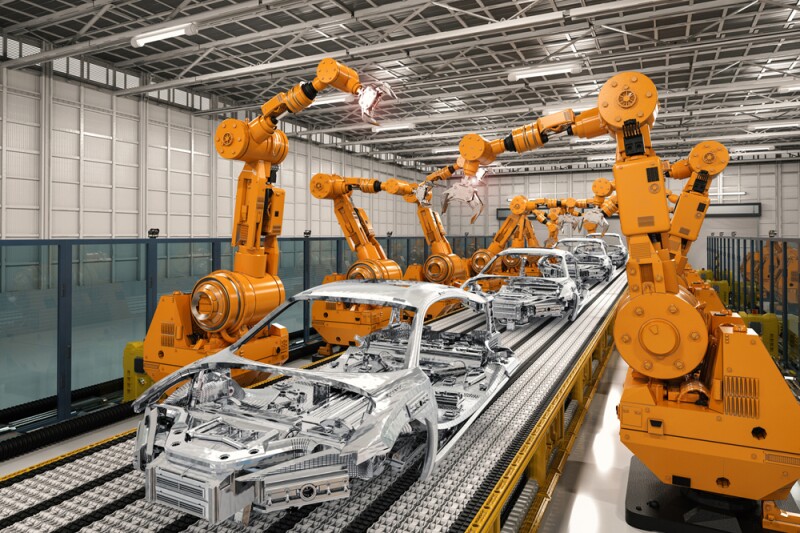Ads
The advent of robotics technology is reshaping the face of modern industry at an accelerating pace. In this post, we'll break down how revolutionary automation is transforming various industrial sectors, from manufacturing to logistics, medicine, and beyond. By delving deeper into this phenomenon, we'll discover the ways these intelligent machines are redefining productivity, efficiency, and quality in all spheres.
We live in an era where the word "robot" is no longer limited to science fiction narratives, but has become an everyday reality. Robots are improving production systems, reducing human error, and enhancing companies' ability to achieve ambitious goals. We will also explore how this technology is affecting the workforce and the ethical implications of its implementation.
Ads
Finally, we'll consider what the future of automation might hold. From collaborative robots working alongside humans to the implementation of Artificial Intelligence, the robotics revolution is changing the game. This post aims to be a comprehensive guide to understanding how robotics is transforming modern industry and how it may impact our lives in the near future. Join us for this exciting exploration of the age of automation.
Robotization and Modern Industry
The rise of robotics in modern industry has led to a profound and revolutionary transformation. Robotics has introduced more efficient and precise production methods, increasing productivity and reducing operating costs.
Ads

Industrial Automation: An Overview
Industrial automation is the use of robotic systems or elements to control machinery and production processes. This technology reduces the need for human intervention, resulting in faster and more precise production and greater workplace safety.
The use of robots in industry has increased dramatically in recent years. According to the International Federation of Robotics, the number of industrial robots in use worldwide is expected to reach 3 million by 2020.
Impact of Robotics on Industry
The impact of robotics on modern industry is profound and broad. Robotics has enabled companies to modernize their operations and become more competitive in the global marketplace. Here are three ways robotics is transforming modern industry:

Greater Efficiency and Productivity
Robots can work uninterruptedly 24 hours a day, 7 days a week. They don't need breaks, vacations, or downtime for maintenance. This means they can produce more goods in less time, increasing efficiency and productivity.
Furthermore, robots are capable of performing tasks with a level of precision that surpasses humans. This minimizes errors and waste, which in turn reduces costs and increases product quality.
Improving Workplace Safety
Robots can perform tasks that are dangerous for humans, such as working with toxic materials or in hostile environments. This not only protects workers from injury or illness, but also reduces workers' compensation costs and increases staff morale.
Robotics and the Jobs of the Future
Robotics is also changing the job landscape. As manual and repetitive tasks become automated, new job opportunities are being created in areas such as robot programming, maintenance, and monitoring robot operations.
Workforce Training
As robotics becomes an integral part of modern industry, the demand for technical skills is increasing. Workers now need skills in programming, mechanical and electrical engineering, and data analysis to stay relevant in the job market.
Therefore, education and training are vital to preparing the workforce for the jobs of the future. Vocational training programs and workplace training initiatives can play a crucial role in this regard.
Employment Opportunities and Challenges
While robotics may eliminate some jobs, it also creates new opportunities. According to a McKinsey report, robotics could create up to 20 million new jobs by 2030.
However, these jobs will require specific skills and training. Therefore, the transition to a more automated economy presents significant challenges in terms of workforce training and adaptation.
The Future of Robotics in Industry
As technology continues to advance, robotics will play an increasingly important role in industry. We are already seeing the emergence of more sophisticated and versatile robots, capable of performing a variety of tasks with great precision.
Autonomous Robots
Autonomous robots, which can operate independently without human supervision, are on the rise. These robots can learn and adapt to new environments and tasks, making them especially useful in situations where conditions can change rapidly.
Artificial Intelligence and Robotics
Artificial intelligence (AI) is playing an increasingly important role in robotics. Robots equipped with AI can process and analyze large amounts of data, allowing them to make decisions and perform tasks more efficiently.
With the combination of robotics and AI, we are on the threshold of a new era of industrial automation. This represents enormous potential for increasing efficiency and productivity, but also poses significant challenges that must be addressed to ensure a successful transition to a more automated economy.
Conclusion
In conclusion, robotics is significantly revolutionizing modern industry. With its ability to improve efficiency, precision, and safety, it is transforming production methods and enabling companies to become more competitive in the global marketplace. While automation may eliminate some jobs, it is also creating new opportunities in technical areas. However, to seize these opportunities, it is crucial to invest in education and training so that the workforce can adapt to the jobs of the future. At the same time, the advancement of robotics also presents challenges in terms of workforce adaptation, which must be addressed to ensure a successful transition to a more automated economy. With the combination of robotics and artificial intelligence, we are on the verge of a new era of industrial automation, which has enormous potential to increase productivity but also requires careful management and planning. Robotics will undoubtedly continue to be a determining factor in the evolution of modern industry.



